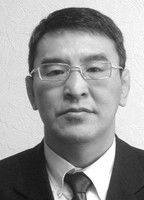Educational and sporting framework provided by national sports for individual physical self-improvement
Фотографии:
ˑ:
Teoriya i praktika fizicheskoy kultury №7 2017, pp.57-58
PhD, Associate Professor V.G. Torgovkin1
PhD, Associate Professor M.I. Borokhin1
Dr.Hab., Professor V.P. Kochnev1
E.P. Kudrin1
1Institute of Physical Culture and Sports of Ammosov North-Eastern Federal University, Yakutsk
The study considers the ways to design the students’ individual physical self-improvement routes. Objective of the study was to offer combinations of training tools to facilitate progress of promising academic athletes and cultivate a permanent physical self-improvement agenda in them. Having analysed the key ideas of the leading researchers on the subject, the authors offered the following systemic elements of a physical self-improvement route: efficient physical progress management customised to the age- and gender-specific qualities and the ethnical, morphological and functional traits; efficient individual resource management; and provisioning for the ethnic and regional traits in the individual physical self-perfection route design – in the context of the “underage, teenage and junior people’s physical education infrastructure restoration projects implemented at Russian Federation universities – for the national health resource being duly developed by values-driven physical education and sporting culture”. Subject to the study were 40 two-to-fourth-year students majoring in National Sports and Ethnic Games.
The study data and analyses showed that mas-wrestling and Hapsagay wrestling practices may be recommended as efficient national sporting and educational framework to bring up new generations of healthy and decently cultured young people.
Keywords: students, physical self-improvement, sporting and educational framework, mas-wrestling, Hapsagay wrestling, technology.
References
- Vilenskiy M.Y. Fizicheskaya kultura v nauchnoy organizatsii protsessa obucheniya v vysshey shkole [Physical education in scientific organization of academic learning process]. Moscow: MSPI publ., 1982, 156 p.
- Zatsiorskiy V.M. Fizicheskie kachestva sportsmena: osnovy teorii i metodiki vospitaniya. 3-e izd. [Athlete's physical qualities: fundamentals of theory and methods of education. 3rd ed.]. Moscow: Sovetskiy sport publ., 2009, 200 p. ISBN 978-5-9718-0340-9.
- Portnyagin I.I., Danilov D.A. Vzaimosvyaz fizicheskogo i intellektualnogo razvitiya lichnosti v natsionalnykh traditsiyakh naroda sakha []. Vospitanie intellektualno razvitoy lichnosti [Interrelation of physical and intellectual development of individual in national traditions of Sakha people]. Yakutsk: YSU publ., 2002, pp. 57-78.
- Portnyagin I.I. Intellektualnoe razvitie shkolnika-sportsmena [Intellectual development of school athlete]. Moscow: Academia publ., 1999, 96 p.
- Portnyagin I.S. Etnopedagogika «Kut-sur»; pedagogicheskie vozzreniya naroda sakha [Ethnopedagogics "Kut-sur"; Pedagogical views of Sakha people]. Moscow: Academia publ., 1999, 184 p.
- Stolyarov V.I., Bal'sevich V.K., Mochenov V.P., Lubysheva L.I. Modernizatsiya fizicheskogo vospitaniya i fizkulturno-sportivnoy raboty v obshcheobrazovatelnoy shkole [Modernization of physical education and physical culture and sports activities at secondary school]. Moscow: Teoriya i praktika fiz. kultury i sporta publ., 2009, 320 p.




 Журнал "THEORY AND PRACTICE
Журнал "THEORY AND PRACTICE